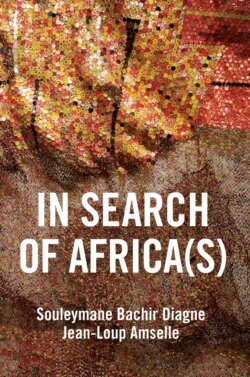Читать книгу In Search of Africa(s) - Souleymane Bachir Diagne - Страница 11
From one dialogue to another
ОглавлениеSo it is on the basis of their respective paths, but also of a certain number of shared concerns, that Diagne and Amselle have here followed a dialogue already initiated in several studies and public encounters.36 They tackle many themes: the question of universalism; the concepts of race, culture and identity; the role of languages in philosophical practice and philosophy in different cultural areas; the various conceptions of Islam, especially in West Africa; and finally the outlines of an Africa which can be thought of at the same time as singular and as plural. Each thinker looks back at his recent ideas on these themes, comparing and contrasting them with those of his interlocutor.
However, it is important to warn the reader that it is not just two styles of thought, but also two opposite modes of address, that are coming into play here. Faithful to a certain polemical temperament and to a taste for straight talking that sometimes dispenses with oratorical precautions, Amselle opens the various debates by trying each time to drive his opponent into a corner and, in particular, to expose the essentialist, culturalist and differentialist logics that might underlie certain critical propositions in postcolonial and decolonial thinking on the relations between Africa and the West, language and thought, Islam and philosophy, culture and politics. The anthropologist thus adopts a resolutely chivalrous posture – in the sense that he enjoys crossing swords with an opponent.
Conversely, without practising the cowardly art of ducking and diving, but striking back whenever he deems it necessary, Diagne refuses to don what he calls ‘the livery’ of the ‘Afrocentrist, particularist and essentialist’ thinker (p. 138). He then fuels the discussion in a less agonistic way, but one that is just as radical as Amselle, proposing a total ‘decentring’, one which ‘reject[s] all centrisms’ (p. 142), but rather highlights branchings and connections, transfers, analogies and reciprocal influences between cultural places and intellectual fields that may be distant but are not distinct in space and time.
So let us wager that the publication of these conversations, which are often uncompromising but always stimulating, will spur other conversations.
Anthony Mangeon is Professor of Francophone Literature at the University of Strasbourg. He is the author or editor of several books on the literatures of Africa, the West Indies and the Black Americas in their relation to knowledge, including: La Pensée noire et l’Occident: de la bibliothèque coloniale à Barack Obama (Cabris: Sulliver, 2010), Postures postcoloniales (Paris: Karthala, Lettres du Sud, 2012), Anthropolitiques: Jean-Loup Amselle, une pensée sans concessions (Paris: Karthala, 2015), Crimes d’auteur: de l’influence, du plagiat et de l’assassinat en littérature (Paris: Hermann, Fictions pensantes, 2016) and L’Empire de la littérature: penser l’indiscipline francophone avec Laurent Dubreuil (Rennes: Presses universitaires de Rennes, Plurial, 2016).
